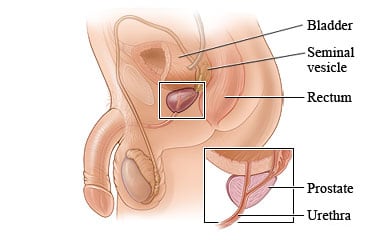What is transurethral resection of the prostate?

Transurethral resection of the prostate (TURP) is surgery to reduce or remove prostate tissue. It is done when an overgrown prostate gland is pressing on the urethra and making it hard to urinate.
The prostate gland is a small organ just below the bladder. It makes most of the fluid in semen. The urethra is the tube that carries urine from the bladder out of the body through the penis. It passes through the prostate. When the prostate gets too large, it can press on the urethra.
Your doctor will give you medicine to make you sleep or feel relaxed. You will be kept comfortable. If you are awake during the surgery, you will get medicine to numb you from the chest down.
The doctor puts a thin, lighted tube into your urethra. This is called a scope. It goes in through the opening in your penis. Then the doctor puts small surgical tools through the scope. These tools are used to remove the part of the prostate that is blocking urine flow. When the doctor is finished, the scope is taken out.
This surgery may make it easier for you to urinate. You may have better control when you start and stop your urine stream. And you may feel like you get more relief when you urinate.
Most people go home from the hospital 1 or 2 days after surgery. You may be able to go back to work or most of your usual routine in 1 to 3 weeks. But for about 6 weeks, you will need to avoid heavy lifting and activities that might put extra pressure on your bladder.
How do you prepare for surgery?
Surgery can be stressful. This information will help you understand what you can expect. And it will help you safely prepare for surgery.
Preparing for surgery
- If you plan to have biological children, talk to your doctor about saving your sperm before the surgery. After TURP, there is a chance that your semen may go into your bladder instead of out through your penis.
- You may need to empty your bowels with an enema or laxative. Your doctor will tell you how to do this.
- Understand exactly what surgery is planned, along with the risks, benefits, and other options.
- Tell your doctor ALL the medicines, vitamins, supplements, and herbal remedies you take. Some may increase the risk of problems during your surgery. Your doctor will tell you if you should stop taking any of them before the surgery and how soon to do it.
- If you take aspirin or some other blood thinner, ask your doctor if you should stop taking it before your surgery. Make sure that you understand exactly what your doctor wants you to do. These medicines increase the risk of bleeding.
- Make sure your doctor and the hospital have a copy of your advance directive. If you don’t have one, you may want to prepare one. It lets others know your health care wishes. It’s a good thing to have before any type of surgery or procedure.
- Be sure you have someone to take you home. Anesthesia and pain medicine will make it unsafe for you to drive or get home on your own.
What happens on the day of surgery?
- Follow the instructions exactly about when to stop eating and drinking. If you don't, your surgery may be canceled. If your doctor told you to take your medicines on the day of surgery, take them with only a sip of water.
- Take a bath or shower before you come in for your surgery. Do not apply lotions, perfumes, deodorants, or nail polish.
- Do not shave the surgical site yourself.
- Take off all jewelry and piercings. And take out contact lenses, if you wear them.
At the hospital or surgery center
- Bring a picture ID.
- The area for surgery is often marked to make sure there are no errors.
- You will be kept comfortable and safe by your anesthesia provider. The anesthesia may make you sleep. Or it may just numb the area being worked on.
- The surgery will take 1 to 2 hours.
When should you call your doctor?
- You have questions or concerns.
- You don't understand how to prepare for your surgery.
- You become ill before the surgery (such as fever, flu, or a cold).
- You need to reschedule or have changed your mind about having the surgery.
Where can you learn more?
Go to http://www.healthwise.net/patientEd
Enter R841 in the search box to learn more about "Transurethral Resection of the Prostate (TURP): Before Your Surgery".
Current as of: April 9, 2025
Author: Ignite Healthwise, LLC Staff
Clinical Review Board
All Ignite Healthwise, LLC education is reviewed by a team that includes physicians, nurses, advanced practitioners, registered dieticians, and other healthcare professionals.

